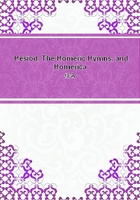
第55章 THE GREAT EOIAE (fragments)(1)
Fragment #1 --
Pausanius, ii. 26. 3:
Epidaurus. According to the opinion of the Argives and the epic poem, the "Great Eoiae", Argos the son of Zeus was father of Epidaurus.
Fragment #2 --
Anonymous Comment. on Aristotle, Nicomachean Ethics, iii. 7:
And, they say, Hesiod is sufficient to prove that the word PONEROS (bad) has the same sense as `laborious' or `ill-fated';for in the "Great Eoiae" he represents Alcmene as saying to Heracles: `My son, truly Zeus your father begot you to be the most toilful as the most excellent...'; and again: `The Fates (made) you the most toilful and the most excellent...'
Fragment #3 --
Scholiast on Pindar, Isthm. v. 53:
The story has been taken from the "Great Eoiae"; for there we find Heracles entertained by Telamon, standing dressed in his lion-skin and praying, and there also we find the eagle sent by Zeus, from which Aias took his name (1).
Fragment #4 --
Pausanias, iv. 2. 1:
But I know that the so-called "Great Eoiae" say that Polycaon the son of Butes married Euaechme, daughter of Hyllus, Heracles' son.
Fragment #5 --
Pausanias, ix. 40. 6:
`And Phylas wedded Leipephile the daughter of famous Iolaus: and she was like the Olympians in beauty. She bare him a son Hippotades in the palace, and comely Thero who was like the beams of the moon. And Thero lay in the embrace of Apollo and bare horse-taming Chaeron of hardy strength.'
Fragment #6 --
Scholiast on Pindar, Pyth. iv. 35:
`Or like her in Hyria, careful-minded Mecionice, who was joined in the love of golden Aphrodite with the Earth-holder and Earth-Shaker, and bare Euphemus.'
Fragment #7 --
Pausanias, ix. 36. 7:
`And Hyettus killed Molurus the dear son of Aristas in his house because he lay with his wife. Then he left his home and fled from horse-rearing Argos and came to Minyan Orchomenus. And the hero received him and gave him a portion of his goods, as was fitting.'
Fragment #8 --
Pausanias, ii. 2. 3:
But in the "Great Eoiae" Peirene is represented to be the daughter of Oebalius.
Fragment #9 --
Pausanias, ii. 16. 4:
The epic poem, which the Greek call the "Great Eoiae", says that she (Mycene) was the daughter of Inachus and wife of Arestor:
from her, then, it is said, the city received its name.
Fragment #10 --
Pausanias, vi. 21. 10:
According to the poem the "Great Eoiae", these were killed by Oenomaus (2): Alcathous the son of Porthaon next after Marmax, and after Alcathous, Euryalus, Eurymachus and Crotalus. The man killed next after them, Aerias, we should judge to have been a Lacedemonian and founder of Aeria. And after Acrias, they say, Capetus was done to death by Oenomaus, and Lycurgus, Lasius, Chalcodon and Tricolonus.... And after Tricolonus fate overtook Aristomachus and Prias on the course, as also Pelagon and Aeolius and Cronius.
Fragment #11 --
Scholiast on Apollonius Rhodius, Arg. iv. 57:
In the "Great Eoiae" it is said that Endymion was transported by Zeus into heaven, but when he fell in love with Hera, was befooled with a shape of cloud, and was cast out and went down into Hades.
Fragment #12 --
Scholiast on Apollonius Rhodius, Arg. i. 118: